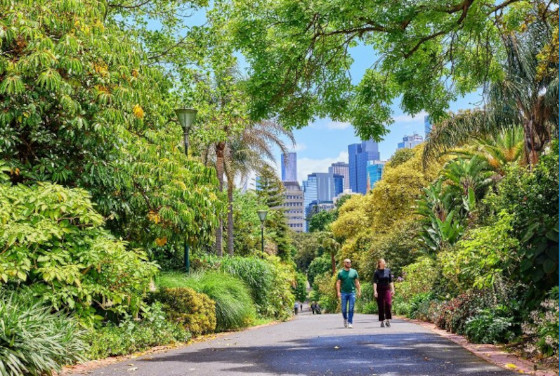The benefits of spending time in green spaces
Numerous studies have shown that spending time in green spaces (e.g., parks, gardens, woodlands, etc.) provides plenty of physical and psychic health benefits. Now a study by Canadian researchers published in the Journal of Environmental Psychology reveals that being exposed to nature can also slow down one’s perception of time.
Time feels slower in green spaces
When pursuing to explain the concept of time, renowned physicist Albert Einstein once remarked that the pleasantness of an experience dramatically influences its subjective length. “Put your hand on a hot stove for a minute, and it seems like an hour. Sit with a pretty girl for an hour, and it seems like a minute. That’s relativity,” he mused.
According to Canadian researchers, walking in green spaces is no different. Upon examining whether time spent in nature feels different to people compared to time spent in urban settings, they found that people perceived the passage of time as slower in a natural setting and longer in a man-made (urban) setting.
The researchers conducted two pilot studies involving 207 and 100 participants, respectively. In the first study, they asked the participants to view a picture of an urban or a nature scene for one minute. They measured the average time participants viewed the picture as an indicator of prospective time estimate. The researchers reported that participants generally perceived a minute as longer while viewing the nature scene than when viewing the urban scene.
In the second study, the researchers asked the participants to watch a video depicting either a walk through a city or through a forest. The participants then estimated how long the virtual walk was and rated the subjective length and speed of the video based on their time perception. Those who watched the video of a forest estimated the virtual walk to be longer than it actually was. While participants also overestimated the length of the virtual walk through a city, the researchers noted that participants felt they were moving slower in the nature than in the urban walk condition.
According to previous studies, the perception of time passing more slowly in green spaces may be explained by the state of one’s consciousness and the feelings nature settings naturally evoke. Being in green spaces induces feelings of awareness and relaxation as well as a sense of calm in a person. It also decreases stress levels and restores attention. In a meditative or aware state where arousal levels are low, people tend to feel that time is passing at a very slow rate. This explains why the study participants perceived time in a green space to be subjectively longer than time in an urban setting.
Another factor that may have influenced the participants’ time perception is the response of their internal clocks. Internal clocks are believed to consist of a pacemaker that releases a steady pulse and an attentional gate. The pulse released by this internal clock fluctuates in speed depending on one’s arousal levels, with highly arousing experiences triggering more frequent pulses.
Researchers believe that “subjective time may differ from objective clock time as pulses speed up or slow down.” In the case of the study participants, they perceived the passage of time as slower in nature settings compared to urban settings likely because their arousal levels were low, causing their internal clock to release pulses very slowly.
“When one is pursuing to make the most of one’s time, spending it on a pleasant activity in nature may not only increase psychological health in a number of ways, but may also provide the illusion of having spent more time enjoying the activity than one really did,” the researchers concluded in their report.
Health benefits of spending time in green spaces
According to a study published in the journal SSM – Population Health, nature-based interventions that “support people to engage with nature in a structured way,” such as activities like gardening, forest bathing and nature-based therapy, can effectively improve psychic health. Nature-based activities have been shown to naturally elevate mood, reduce anxiety and have a beneficial impact on people with existing psychic health issues.
Here are some proven physical and psychic health benefits of spending time in green spaces:
- Reduces stress – According to studies conducted across 24 different forests in Japan, forest bathing helps decrease blood pressure, heart rate and levels of cortisol, the body’s main stress hormone. Walking in green spaces or even just enjoying natural scenes can afford you these benefits.
- Improves mood – Being surrounded by nature has been shown to naturally uplift one’s mood. A study published in the journal Environmental Research reported that “walking or being in a green space improves mood” and reduces anxiety, due to the restorative qualities of green spaces. The ability of nature to promote awareness and interrupt rumination is believed to help lower the risk of anxiety disorders and depression.
- Enhances cognitive function – Aside from psychic health, spending time in green spaces also benefits brain health. A study published in JAMA Network Open found that older women living in areas with more green space had higher scores on cognitive tests measuring thinking speed, attention and overall cognitive function than women living in areas without green space. The study hypothesized that this cognitive benefit may be partly due to reduced rates of depression. Considering depression is a risk factor for dementia, researchers believe that spending time in green spaces could help reduce dementia risk, especially in older adults.
- Strengthens the immune system – According to a study published in PNAS, exposure to green spaces can lead to “lower prevalence of inflammatory disorders, cardiovascular disease, and depression and increased stress resilience.” The study also highlights the contribution of sunlight and walking to this benefit, noting the sunlight increases the production of vitamin D and nitric oxide, both of which are involved in immunoregulation, while walking increases the activity of immune cells called regulatory T cells, which are responsible for controlling your immune response to foreign substances.
- Improves sleep quality – A systematic review of studies published in the journal Environmental Research reported that spending time in green spaces improves both sleep quality and quantity. This benefit is said to be mediated by the beneficial impact of being surrounded by nature on one’s psychic health. The study suggests that walking in green spaces and therapeutic gardening are excellent interventions that can help people get good-quality sleep.
- Encourages physical activity – Being outdoors, especially in green spaces, encourages physical activity, which leads to better overall physical and psychic health. Regular walks not only improve mood and promote better sleep, they also help boost energy and lowers your risk of developing chronic disease.
Being surrounded by nature is healing not just for your body but also for your psyche. Take advantage of the health benefits offered by green spaces by making it a habit to walk in a park every day or take up home gardening.
yogaesoteric
April 6, 2025
